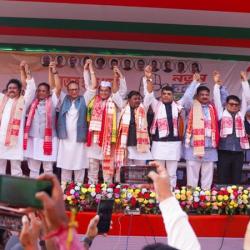International Women's Day is observed globally on March 8 every year since the year 1910. This day was proposed by Clara Jetkin at the second International Women's Conference and accepted unanimously by the participants. In India this day is observed with much enthusiasm and fanfare.
The state of Assam is also not left behind where women have enjoyed equal rights with men since ancient times. In this part of the country women have earned the status of symbol of strength. They have shown their strength in the freedom movement of the country. Women power of Kanaklata Barua, Bhogeswari Phukanani and Khahuli Nath is the best example in the history of Assam.
During the first part of twentieth century when the wave of women up rise was blowing in the country and Mahatma Gandhi started non-cooperation movement against the British rule, the women from Assam took leading part in the struggle. Even Gandhi had expressed his view that in non-cooperation movement women's participation was more important than that of the men, because they were the symbol of strength. His message encouraged the womenfolk of Assam to come out of the four walls of their homes and participate in social and political activities. Much importance was given to women's education after Independence, with an eye to social change in the country.
Indian National Congress in Mumbai on August 9,1942, resolved to 'Do or die' for Independence of the country and began agitation with 'Quit India' slogan against the British regime. Young and old, men and women, boys and girls, all fearlessly and wholeheartedly joined the movement. Among them was Kanaklata Barua. She got an opportunity to fulfill her dream of serving the country. As soon as the 'Quit India' movement began the British rulers started arresting Congress leaders. Under the leadership of revolutionary Jyoti Prasad Agarwala, in the district of Darrang a resolution was adopted unanimously to hoist National flag at the court and police station, as they were the marks of British Empire. Being aware of women's participation in the nation's freedom struggle, Kanaklata enrolled herself in the suicide squad. The day for peaceful and non-violent action was decided as September 20.
According to the programme, freedom fighters with National flag had to capture local police station. Four thousands people from Kalabari side and an equal number from Barangabari moved towards Gohpur police station. In the front line was Kanaklata Barua holding a National flag in her hands. She requested the officer in charge of the police station to allow her to hoist the flag at the western gate peacefully. The officer in charge ignored her request and threatened to shoot her, if she dared to proceed further. Firebrand Kanaklata marched ahead and had to face the bullets of the strong police force. She laid down her life for the freedom of the country.
Another instance of similar martyrdom was from the district of Nagaon. Berhampur in the district was also on fire of Quit India movement. Among the residents of this place was a brave lady freedom fighter, Bhogeswari Phukanani. Born in 1885, she had a family of six sons and two daughters, beside her husband, Bhogeswar Phukan. Berhampur Congress Office was on seize by military and police during the freedom movement. Police and military atrocities were going on extremely high in the western part of Nagaon district. The revolutionaries took back control of the office and were celebrating their victory. At the same time to take revenge the British army sent a military force under Capt Finish. The joyful atmosphere of the place turned into a fearful picture of a battlefield. Echo of 'Vande Mataram' pervaded all around. People from nearby villages came out with National flags in their hands. Ratnamala and Bhogeswari Phukanani were leading the mob. As soon as they came face to face with Capt Finish, he snatched the flag from Ratnamala's hand. Ratnamala fell down on the earth and the flag was in the hands of Capt Finish. Noticing the insult of the National flag, Bhogeswari got excited and immediately hit on the head of the Captain by pole of the flag in her hand. A furious Captain Finish pulled out his revolver and fired at the head of Bhogeswari. She fell down on the ground and succumbed to her injury. The day was September 20,1942.
Khahuli Nath of Dumdumia village under Dhing area of Nagaon district also laid down her life while going to capture Dhekiajuli police station along with her husband Ponaram Nath. She fell victim of police firing. In another event people from Dhekiajuli came out of their homes to protest against the British rule and hoist the National flag at the police station. Among them was a suicide squad member Golok Chandra Neog. Observing the fall of the co-activist Manbar Nath after being hit by the police bullet, Golok moved ahead with National flag in his hand. Realizing that Golok Chandra was face to face with the police his mother, Kumali Neog, hurriedly came out to save the life of her younger son and suffered a bullet strike on her chest. She fell down and died on the spot.
In addition to the martyrdom of these womenfolk, a large number of female activists were seriously injured, while facing the police and military bullets. Around five hundred women freedom fighters had to bear the brunt of British atrocities in Assam in the movement for the country's liberation. Their names will always be remembered by the people of the nation.
The state of Assam is also not left behind where women have enjoyed equal rights with men since ancient times. In this part of the country women have earned the status of symbol of strength. They have shown their strength in the freedom movement of the country. Women power of Kanaklata Barua, Bhogeswari Phukanani and Khahuli Nath is the best example in the history of Assam.
During the first part of twentieth century when the wave of women up rise was blowing in the country and Mahatma Gandhi started non-cooperation movement against the British rule, the women from Assam took leading part in the struggle. Even Gandhi had expressed his view that in non-cooperation movement women's participation was more important than that of the men, because they were the symbol of strength. His message encouraged the womenfolk of Assam to come out of the four walls of their homes and participate in social and political activities. Much importance was given to women's education after Independence, with an eye to social change in the country.
Indian National Congress in Mumbai on August 9,1942, resolved to 'Do or die' for Independence of the country and began agitation with 'Quit India' slogan against the British regime. Young and old, men and women, boys and girls, all fearlessly and wholeheartedly joined the movement. Among them was Kanaklata Barua. She got an opportunity to fulfill her dream of serving the country. As soon as the 'Quit India' movement began the British rulers started arresting Congress leaders. Under the leadership of revolutionary Jyoti Prasad Agarwala, in the district of Darrang a resolution was adopted unanimously to hoist National flag at the court and police station, as they were the marks of British Empire. Being aware of women's participation in the nation's freedom struggle, Kanaklata enrolled herself in the suicide squad. The day for peaceful and non-violent action was decided as September 20.
According to the programme, freedom fighters with National flag had to capture local police station. Four thousands people from Kalabari side and an equal number from Barangabari moved towards Gohpur police station. In the front line was Kanaklata Barua holding a National flag in her hands. She requested the officer in charge of the police station to allow her to hoist the flag at the western gate peacefully. The officer in charge ignored her request and threatened to shoot her, if she dared to proceed further. Firebrand Kanaklata marched ahead and had to face the bullets of the strong police force. She laid down her life for the freedom of the country.
Another instance of similar martyrdom was from the district of Nagaon. Berhampur in the district was also on fire of Quit India movement. Among the residents of this place was a brave lady freedom fighter, Bhogeswari Phukanani. Born in 1885, she had a family of six sons and two daughters, beside her husband, Bhogeswar Phukan. Berhampur Congress Office was on seize by military and police during the freedom movement. Police and military atrocities were going on extremely high in the western part of Nagaon district. The revolutionaries took back control of the office and were celebrating their victory. At the same time to take revenge the British army sent a military force under Capt Finish. The joyful atmosphere of the place turned into a fearful picture of a battlefield. Echo of 'Vande Mataram' pervaded all around. People from nearby villages came out with National flags in their hands. Ratnamala and Bhogeswari Phukanani were leading the mob. As soon as they came face to face with Capt Finish, he snatched the flag from Ratnamala's hand. Ratnamala fell down on the earth and the flag was in the hands of Capt Finish. Noticing the insult of the National flag, Bhogeswari got excited and immediately hit on the head of the Captain by pole of the flag in her hand. A furious Captain Finish pulled out his revolver and fired at the head of Bhogeswari. She fell down on the ground and succumbed to her injury. The day was September 20,1942.
Khahuli Nath of Dumdumia village under Dhing area of Nagaon district also laid down her life while going to capture Dhekiajuli police station along with her husband Ponaram Nath. She fell victim of police firing. In another event people from Dhekiajuli came out of their homes to protest against the British rule and hoist the National flag at the police station. Among them was a suicide squad member Golok Chandra Neog. Observing the fall of the co-activist Manbar Nath after being hit by the police bullet, Golok moved ahead with National flag in his hand. Realizing that Golok Chandra was face to face with the police his mother, Kumali Neog, hurriedly came out to save the life of her younger son and suffered a bullet strike on her chest. She fell down and died on the spot.
In addition to the martyrdom of these womenfolk, a large number of female activists were seriously injured, while facing the police and military bullets. Around five hundred women freedom fighters had to bear the brunt of British atrocities in Assam in the movement for the country's liberation. Their names will always be remembered by the people of the nation.
- Add new comment
- 79194 reads










Comments
Pages
Add new comment